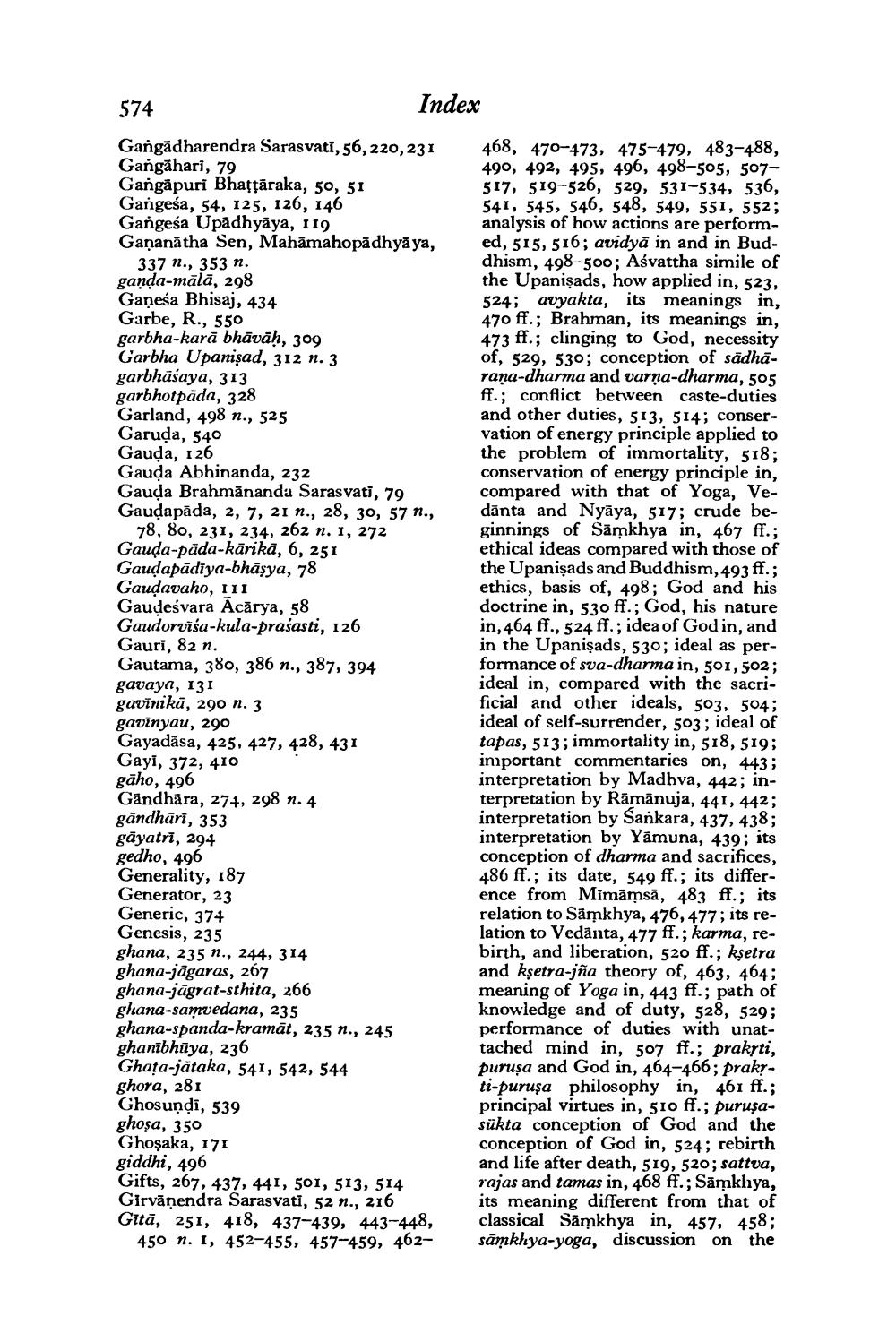________________
574
Index
Gangādharendra Sarasvati, 56,220,231 Gangahari, 79 Gangāpuri Bhațţāraka, 50, 51 Gangesa, 54, 125, 126, 146 Gangesa Upadhyāya, 119 Gañanātha Sen, Mahāmahopādhyāya,
337 n., 353 n. ganda-mālā, 298 Ganesa Bhisaj, 434 Garbe, R., 550 garbha-karā bhāvāh, 309 Garbha Upanişad, 312 n. 3 garbhāśaya, 313 garbhotpäda, 328 Garland, 498 n., 525 Garuda, 540 Gauda, 126 Gauda Abhinanda, 232 Gauda Brahmānanda Sarasvati, 79 Gaudapāda, 2, 7, 21 n., 28, 30, 57 n.,
78, 80, 231, 234, 262 n. 1, 272 Gauda-pāda-kārika, 6, 251 Gaudapādīya-bhāşya, 78 Gaudavaho, 111 Gaudesvara Acărya, 58 Gaudorvisa-kula-prasasti, 126 Gauri, 82 n. Gautama, 380, 386 n., 387, 394 gavaya, 131 gavīnikā, 290 n. 3 gavinyau, 290 Gayadāsa, 425, 427, 428, 431 Gayi, 372, 410 gāho, 496 Gāndhāra, 274, 298 n. 4 gāndhārī, 353 gāyatrī, 294 gedho, 496 Generality, 187 Generator, 23 Generic, 374 Genesis, 235 ghana, 235 n., 244, 314 ghana-jāgaras, 267 ghana-jāgrat-sthita, 266 ghana-samvedana, 235 ghana-spanda-kramāt, 235 n., 245 ghanībhūya, 236 Ghața-jätaka, 541, 542, 544 ghora, 281 Ghosundi, 539 ghosa, 350 Ghosaka, 171 giddhi, 496 Gifts, 267, 437, 441, 501, 513, 514 Girvāṇendra Sarasvati, 52 n., 216 Gitā, 251, 418, 437-439, 443-448,
450 n. 1, 452-455, 457-459, 462
468, 470-473, 475-479, 483-488, 490, 492, 495, 496, 498-505, 507517, 519--526, 529, 531-534, 536, 541, 545, 546, 548, 549, 551, 552; analysis of how actions are performed, 515, 516; avidyā in and in Buddhism, 498-500; Aśvattha simile of the Upanișads, how applied in, 523, 524; avyakta, its meanings in, 470 ff.; Brahman, its meanings in, 473 ff.; clinging to God, necessity of, 529, 530; conception of sādharana-dharma and varna-dharma, 505 ff.; conflict between caste-duties and other duties, 513, 514; conservation of energy principle applied to the problem of immortality, 518; conservation of energy principle in, compared with that of Yoga, Vedānta and Nyāya, 517; crude beginnings of Samkhya in, 467 ff.; ethical ideas compared with those of the Upanișads and Buddhism,493 ff.; ethics, basis of, 498; God and his doctrine in, 530 ff.; God, his nature in, 464 ff., 524 ff.; idea of God in, and in the Upanişads, 530; ideal as performance of sva-dharma in, 501, 502; ideal in, compared with the sacrificial and other ideals, 503, 504; ideal of self-surrender, 503; ideal of tapas, 513; immortality in, 518, 519; important commentaries on, 443; interpretation by Madhva, 442; interpretation by Rāmānuja, 441, 442; interpretation by Sankara, 437, 438; interpretation by Yamuna, 439; its conception of dharma and sacrifices, 486 ff.; its date, 549 ff.; its difference from Mimāmsā, 483 ff.; its relation to Sāmkhya, 476,477; its relation to Vedānta, 477 ff.; karma, rebirth, and liberation, 520 ff.; kşetra and kşetra-jña theory of, 463, 464; meaning of Yoga in, 443 ff.; path of knowledge and of duty, 528, 529; performance of duties with unattached mind in, 507 ff.; prakyti, purusa and God in, 464-466; prakrti-puruşa philosophy in, 461 ff.; principal virtues in, 510 ff.; puruşasükta conception of God and the conception of God in, 524; rebirth and life after death, 519, 520; sattva, rajas and tamas in, 468 ff.; Samkhya, its meaning different from that of classical Samkhya in, 457, 458; sāmkhya-yoga, discussion on the




